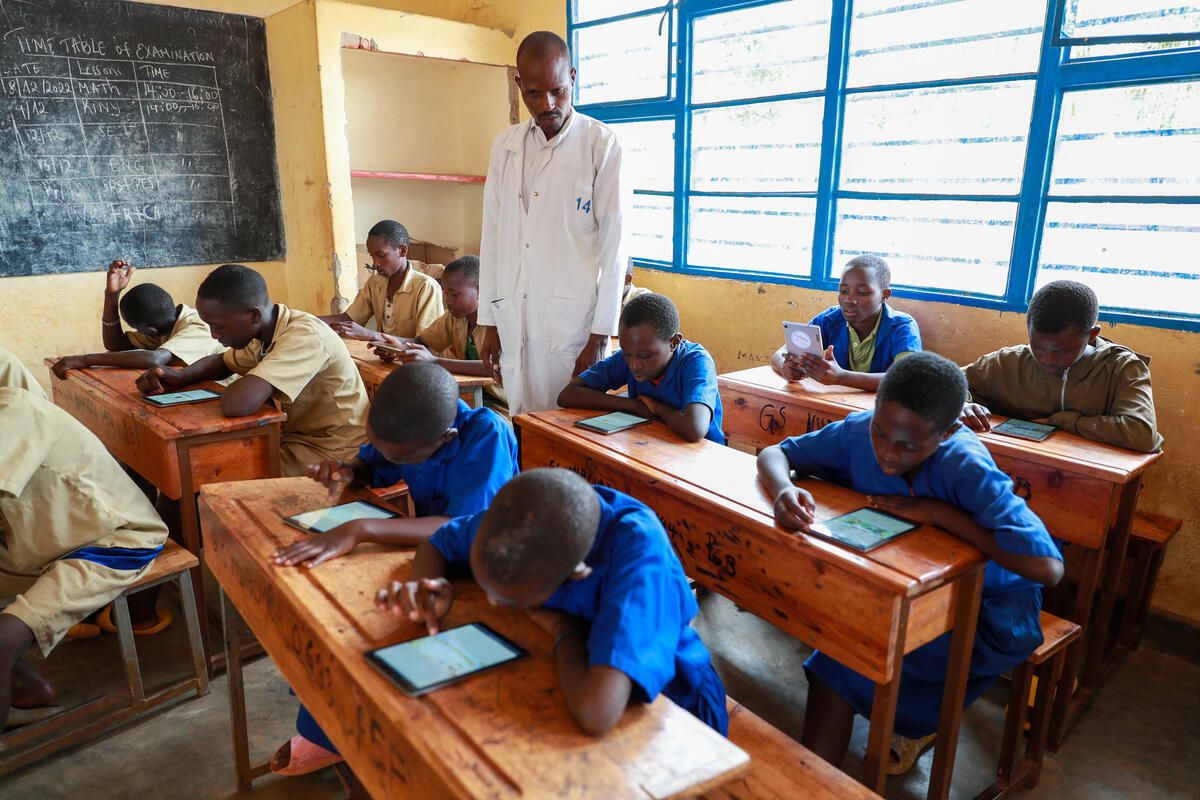
World Refugee Day: Mapping schools through Giga
Today’s World Refugee Day pays tribute to the ever-rising number of people forcibly displaced from their homes. After a decade of increases, 2023 recorded the largest ever single-year growth of displaced persons, climbing 8.8 million to a total of over 117 million, of whom over 40 per cent are children under 18, according to the latest statistics from the UN Refugee Agency (UNHCR).
That’s 1 in 69 people; a decade ago the ratio was 1 in 125.
Forced to flee by conflict, persecution or natural disasters, the plight of these communities can be compounded by isolation, which makes access to mobile phones and the Internet an essential tool to stay in touch with loved ones and rebuild their lives, from gaining access to financial services and health care to furthering their education and economic prospects.
This is a priority issue for United Nations agencies, including UNHCR and the International Telecommunication Union (ITU), who joined forces a year ago in an ambitious effort to connect refugees around the world, together with GSMA, which represents the interests of mobile operators worldwide, and the governments of Luxembourg and Spain. Called the Connectivity for Refugees Initiative, its aim is to mobilize the expertise, resources and investments needed to ensure that all major refugee hosting areas have available and affordable connectivity by 2030.
“Through the Connectivity for Refugees initiative, we are exploring connectivity solutions that can be scaled, together with the beneficiaries,” said Christine Sund, Senior Advisor, Regional Office for Africa, ITU. “Scaling what works and ensuring that sustainability is integrated into the design of connectivity solutions and approaches.”
ITU and UNICEF Giga initiative
Building on this, ITU, together with UNICEF, expanded their global commitment to bring Internet access to schools around the world through the Giga initiative, also to areas hosting refugees and displaced children and youth. The “Mapping Refugee Schools” pledge was made in support of the Connectivity for Refugees multistakeholder pledge as part of the Giga mission to connect all schools to the Internet by 2030.
Giga is bringing its school and infrastructure mapping expertise to ensure that schools hosting refugees are identified and included in national connectivity plans.
The pledge was announced at ITU’s Partner2Connect Annual Meeting and at UNHCR’s Global Refugee Forum in December 2023.
The school-aged children and young forcibly displaced
Of the world’s 117 million forcibly displaced and stateless people, 36.4 million are refugees, and 14.8 million school-aged children and young people (up from 10 million in 2022) who often lack the same sustained access to high-quality connected education as their peers in the global community.
UNHCR: Connectivity for refugees and digital employment
UNHCR’s John Warnes, Senior Innovation Officer, who leads on the Connectivity for Refugees and Digital Employment strategic initiatives within the agency, said that since last December’s Global Refugee Forum, the Connectivity for Refugees initiative has been prioritizing countries and gathering data that will help advance better informed and designed connectivity solutions. “These datasets also include Giga and ITU data and build off important analytical work undertaken through Giga and among its partners. Through this we have a better understanding of the knowledge gaps where we’re operating.
Country-level rollout
“Our collaboration with Giga will become ever closer as the initiative is rolled out at the country level. This will lead to more concrete discussions about mapping and designing solutions,” he said.
To date, priority countries confirmed so far are Ethiopia, Egypt and South Sudan, following a number of important pledges at the Global Refugee Forum, he said, and others are still under discussion.
For its part, Giga has so far connected 13 refugee-hosting schools in Rwanda. In 2023, alongside UNICEF’s country office in Kenya, Giga helped to connect 41 such schools in Kakuma and Dadaab in Kenya. This year, an additional 21 were connected in the country, bringing the total there to 62, with plans to connect more by the end of the year.
Spain: Leading supporter of refugee connectivity
The Spanish government is a leading supporter of refugee connectivity, having made a financial contribution to the Connectivity for Refugees initiative at the Global Refugee Forum, and also backing the Giga initiative, specifically in helping to launch the Giga Technology Centre in Barcelona, the R&D arm of Giga’s high-tech school connectivity solutions.
A spokesman for Spain’s Ministry of Foreign Affairs, European Union and Cooperation, said his government believes that quality education for refugee children “ is a significant and transformative way to make a difference for refugees and their host communities.”
“This initiative intends to support not only the refugees themselves, but the hosting communities as well,” he said “We consider this a key element, since refugee host countries with limited resources are already making a huge effort, and they need our support.”
Header image: © UNHCR/Eric Didier Karinganire
